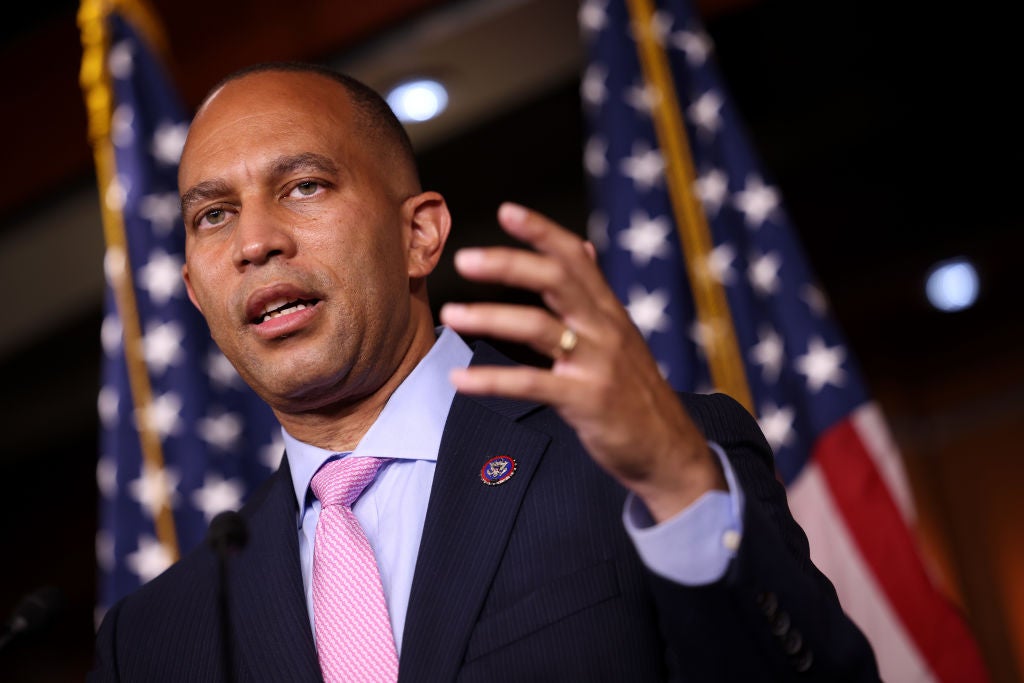Hakeem Jeffries Poised to Make History as First Black Lawmaker to Lead a Party in Congress
Hakeem Jeffries, the current U.S. Representative for New York's 8th congressional district, is poised to make history as the first Black lawmaker to lead a party in Congress. This groundbreaking move marks a significant shift in the political landscape of the United States and is a major milestone for African Americans in politics. Jeffries is set to assume the role of House Majority Leader, making him the highest-ranking Black legislator in the nation's history. This is a momentous event for both Jeffries and the Black community, and one that will have lasting impacts for years to come.
Who is Hakeem Jeffries?
Hakeem Jeffries is an American politician who currently serves as a member of the United States House of Representatives, representing New York’s 8th congressional district. He is set to make history as the first African American lawmaker to lead a party in Congress, as the chairman of the House Democratic Caucus. This is a significant milestone in American history and a reminder that despite the country’s dark past of racial inequality, we are progressing towards a more equitable future.
Jeffries was born and raised in Brooklyn, New York. He received his Bachelor’s degree from SUNY Binghamton in 1992 and his law degree from Georgetown University Law Center in 1996. After working at a prominent law firm, Jeffries went on to work as an Assistant United States Attorney for the Eastern District of New York. His impressive professional career led him to a successful run for the U.S. House of Representatives in 2012.
In Congress, Jeffries has been a proponent of progressive policies, such as protecting Social Security, expanding access to affordable healthcare, promoting criminal justice reform, and reforming immigration laws. He has also been a vocal supporter of gun control, voting in favor of the Bipartisan Background Check Act of 2021, which will require background checks on all gun sales.
Jeffries' victory is an inspiring reminder that progress can be made when it comes to eliminating racism and creating a more equitable society. While there is still much work to be done, it is encouraging to see a Black man make history and lead a party in Congress.
What does this mean for the future of the Democratic Party?
Hakeem Jeffries’ ascension to the role of House Democratic Leader marks a momentous occasion in American political history, as it shows that progress is being made towards greater diversity and representation within the Democratic Party. As the first Black lawmaker to lead a major party in Congress, Jeffries brings to the table a unique perspective and a diverse set of experiences that can help inform policy decisions on behalf of all Americans.
Having a Black leader at the helm of the Democratic Party may also act as an inspiration for other minorities within the party, leading to increased levels of political engagement and participation. It also sets a precedent for further diversifying the party in the future, as Jeffries’ success demonstrates that minority voices can be heard and respected at the highest levels.
At the same time, however, there are still many obstacles that must be overcome in order to ensure that all voices within the Democratic Party are represented fairly and equally. Jeffries’ election is certainly a step in the right direction, but there is still much work to be done in order to create a truly diverse and equitable Democratic Party.
How did Jeffries get to this point?
Hakeem Jeffries has had an impressive career in politics. After completing his undergraduate degree at SUNY Binghamton, he attended Georgetown Law and worked as a public defender in Brooklyn, NY. His career in politics began with his election to the New York State Assembly in 2006, where he served until 2012. During this time, Jeffries became known for his effective leadership, taking on issues like criminal justice reform, economic development, and campaign finance reform.
Jeffries went on to become a member of the U.S. House of Representatives in 2013 and quickly made his presence felt in Washington. He has since held numerous positions of influence in the Democratic Party, serving as a member of the Democratic Policy and Communications Committee and the Budget Committee. In 2020, he was elected chair of the House Democratic Caucus, making him the first African American to serve in this role.
Jeffries has been praised for his ability to lead and unite members of both sides of the aisle and for his commitment to tackling issues that affect all Americans. His successful record of bipartisan accomplishment, combined with his progressive values, have helped propel him to the top of the Democratic Party.
What obstacles does he face?
Hakeem Jeffries faces a number of challenges as he takes on the role of leading the Democratic Party in Congress. As the first Black lawmaker to do so, he will be met with a unique set of obstacles due to a lack of representation in leadership roles. There is a risk that his initiatives may be seen as too progressive, making it difficult for him to gain support from other Democrats. In addition, he could be held to higher expectations due to his race, which could make it difficult for him to achieve success.
Jeffries also faces the challenge of uniting the party, which is split along ideological lines. He must ensure that all members feel heard and included, while maintaining a unified front against Republican opponents. He must also balance his own personal beliefs and preferences with the greater goals of the party as a whole.
Finally, Jeffries will have to navigate the power struggles and machinations of Washington politics. He will have to create and maintain relationships with key figures in Congress, while at the same time dealing with potential backlash from the current administration and other outside forces. All of this will be a difficult but necessary task if he hopes to succeed in his new role.
